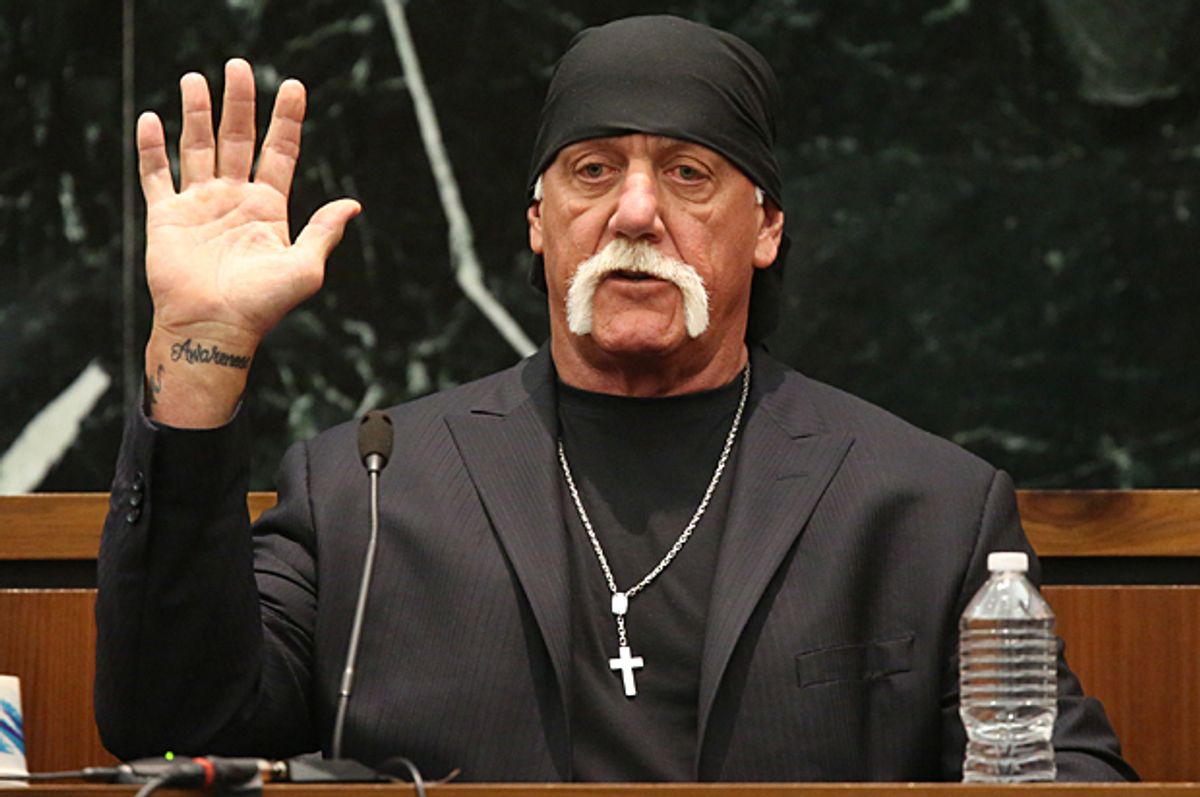The Florida trial happening this week pitting wrestler Hulk Hogan against the website Gawker may seem a bizarre venue for major questions of First Amendment rights and journalistic principles, but so be it. Journalism is a broad church, encompassing both the regal and the rancid, and sometimes you're going to find yourself having broad constitutional arguments over some very questionable material. Thursday's session featured one of the more laughably poor showings from a so-called "expert witness" that you're likely to see, but before we get to that, some background.
At issue in the Hogan v. Gawker case is a 2012 post Gawker published showing a short excerpt of a sex tape someone made of Hogan having sex with someone else's wife. The post reveled in the prurience of what it was publishing. The headline read, "Even for a Minute, Watching Hulk Hogan Have Sex in a Canopy Bed is Not Safe For Work but Watch it Anyway." Hogan promptly sued the site for $100 million.
From Gawker's perspective—and, really, from the perspective of almost any journalist out there—this is a straightforward First Amendment case. Hulk Hogan is a public figure who has discussed his sex life in public. The sex tape's existence was already public knowledge; screenshots had even been published. The post Gawker published about him was true. In legal terms, "public figure" plus "true" usually equals "let's go home" where journalism is concerned. If you start putting curbs on that, you imperil the ability of all journalists to do their jobs. If Hogan was trying to win a defamation suit, he probably wouldn't have a shot.
But Hogan is claiming an invasion of privacy, a hazier concept that leaves Gawker at significantly more risk. Hogan is banking on the jurors being so turned off by the gleeful scuzziness of the Gawker post that they'll look past the basic First Amendment questions and focus on how gross it would feel to have a sex tape of yourself put on the internet.
(The ill-advised decision by former Gawker editor A.J. Daulerio, who wrote the post in question, to joke about sex tapes featuring children during his deposition won't help matters.)
The right of journalists to publish things with no particular news value is an essential component of the First Amendment—dumb speech needs to be protected too!—but that can be an abstract thing to defend. (Full disclosure: I have written for Gawker a couple of times.) Human embarrassment, on the other hand, is universal, even if you're someone as seemingly difficult to embarrass as Hulk Hogan.
Enter into this straight-to-journalism-school-
Foley is a journalism professor in Florida and a former editor of the St. Petersburg Times. He is being paid $350 dollars per hour for his services to Hogan. Over the course of several hours of testimony on Thursday, Gawker's lawyer, Michael Sullivan, got Foley to agree with him on quite a few points. Among them: that Foley didn't read the post or watch the video before agreeing to be a witness for Hogan; that essentially all publications are protected by the First Amendment, unless they break the law; that Foley hasn't been near a newsroom in 24 years; that the underlying story of Hogan's sexual encounter was newsworthy; that Gawker had a right to write about the sex tape; and that Foley's own reasoning for publishing a picture of Demi Moore's infamous Vanity Fair cover back in the early '90s was almost exactly the same as Gawker's reasoning for publishing the Hogan tape.
Oh, and to top it off, Foley admitted that the Society of Professional Journalists ethics code he kept saying Gawker had violated was legally worthless.
What emerged was a portrait of a man who was out of touch with journalism as it's currently practiced and who basically agreed with most of what the defense was trying to prove about its work. (Also, as a journalist, the sight a self-professed arbiter of journalistic values taking large sums of money to try and go after other journalists was quite a distasteful one.)
All in all, it was a pretty sorry spectacle. Whether it will make any difference to the ultimate outcome is another matter. Gawker's president, Heather Dietrick, would likely have been heartened to see some of the more ludicrous aspects of Hogan's charges filleted so deftly by her lawyers, but she's said that she thinks the site will lose the case. The next step will be determined by how much money Gawker is ordered to pay if it loses, and, crucially, whether it decides to appeal the verdict and open itself up to broader constitutional scrutiny from a panel of judges. That's when things could potentially get even uglier than they already have, both for Gawker and for everyone else in the journalism business.

Shares